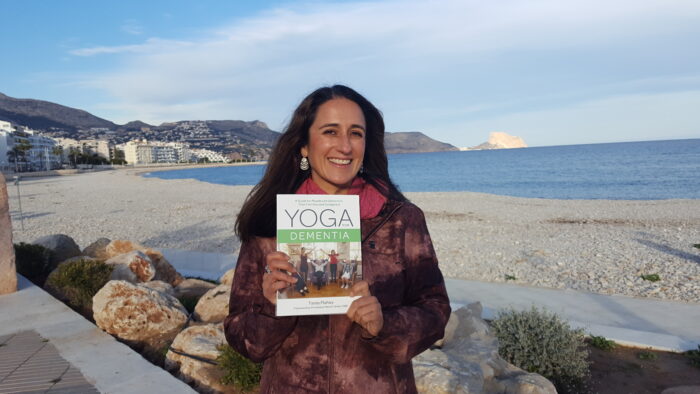The idea for Yoga for Dementia first came to Tania Plahay when she was volunteering and doing Karma Yoga in her local nursing home. Whilst at university Tania cared for her father who had a stroke and other health complications. Tania found the grounding practices of yoga particularly useful during this time.
"My father was from India and from an early age I was interested in ‘eastern’ philosophy and spirituality. I loved the ancient Indian stories and I was fascinated by the portrayal of Hindu gods and Sikh gurus. My father listened to a lot of classical Indian music and I loved how listening to it just transported me into a different realm," says Tania.
She says that her father was a very spiritual man and although he did not practice yoga asana, he was a yogi of sorts and acted as an artistic guru to many, "so in a way he provided my first initiation into yogic ideas."
"It was later on in my late teens that I became interested in yoga asanas and I started practicing whilst I was at university. I felt that the physical movements and breath work really helped me deal with stress. My father was not very well at that time and I was looking after him as well as studying. When he passed away during my final year at university it was yoga, in particular breathwork and meditation, helped me come to terms with the grief and heartbreak," she told Chitra Ravi, in the UK for an interview for CSP.
Patients with dementia are a very non-typical, non-traditional group for yoga. What made you take yoga to this group?
My grandmother lived with dementia for the last 5 years of her life, so I was aware how devastating this illness could be, both to those living with it and their families and loved ones. After I finished my first yoga teacher training, which focused more on physical yoga, I spent some time in a Bihar School of Yoga ashram. The Bihar School of Yoga provides gentle yoga for everybody and there I learnt more about accessible practices such as mudra’s and yoga nidra. I was drawn to these gentle, safe and sustainable practices and thought they might be suitable for those living with dementia.
When I came back to London from staying at the ashram I really wanted to explore my karma yoga practice and began to volunteer at a local residential care home. My ‘students’ if you can call them that, because really I learnt so much from them, ranged from 65 to 94, and some of them were living with various stages of dementia, as well as many other illnesses. I began to notice that after the weekly sessions the clients would be very calm, and their carers would report them being calm for the hours following the sessions. My experience with these clients made me want to explore further how yoga could help those living with dementia.
How did you make yoga accessible to patients with dementia? What adjustments, modifications are needed?
There are lots of adjustments and modifications outlined in my book ‘Yoga for Dementia’ (available via Amazon or direct from Jessica Kingsley publishers), however in short, we adopted simple things like making sure all sequences could be done from a chair. I also made sure the sequences were not too long, so would hold people’s attention. The sequences were also varied to ensure there was something for everybody, and that clients did not get frustrated if there were parts of the sequence they couldn’t do.
Tell us a little bit about the 'Yoga for People Living with Dementia in Residential Care Setting' project. How did this project come about and what were some of the key takeaways from this project?
While I was volunteering at a residential care home, I met Professor Martin Green, the CEO for Care England, which is the umbrella body for independent care homes in England. He introduced me to Maggie Candy who was an innovative care home manager working at a home in London. I started volunteering with her dementia clients and could see the difference that simple yoga made to a lot of them. Through her we met Dr Theresa Shaw who was the CEO of the Foundation for Nursing Studies. They had an innovative grant programme which supported projects that put the needs of patients first. Maggie and I put together a proposal for this grant to expand and test my ideas around making yoga accessible to clients living with dementia in care home settings.
The project took place over 18 months and I worked closely with the home activity coordinators to show them how to instruct the yoga and also how to gather data on how the clients were responding to it.
The main takeaways from the project were that specific yoga exercises are a successful intervention for providing people living with dementia with meaningful and beneficial activities in residential care settings. Residents reported physical, mental and other benefits, and there was a high level of engagement in the yoga project. Staff and others involved in the project said it helped lead to increased levels of wellbeing in the home. If readers would like to know more about the project they can access the full report here:
https://www.fons.org/library/
In your experience, what are the key benefits of yoga to patients with dementia? We would love to hear about specific instances when people with dementia have benefited from your yoga classes
In my experience yoga has many benefits to those living with dementia, however particular benefits are reducing depression, learning ways to help keep calm, anger management, helping us come back to the present moment, improving balance and coordination, and improving breathing techniques.
One participant Donald was involved in the yoga project. He was very uncoordinated and prone to falls. He attended the classes and showed improvements to his coordination and balance, and over time was able to perform a wider range of movements.
Another client Joanna suffered from long term depression before coming to the care home. Her involvement in the yoga sessions helped her feel more positive and well. She also said that yoga helped with her stomach pain.
Wendy, who as well as living with dementia also had arthritis in her knees, reported that the yoga helped her legs feel better, she also enjoyed the breathing exercises and felt that these helped her.
Ray who was often observed looking sad, and who had problems communicating was seen to be smiling in the sessions. Overtime he was able to join in more of the movements during the sessions. Clients such as Beth who often had mood swings and depression were relaxed and comfortable during the sessions.
These are just a few examples of people benefiting from the yoga classes and I have seen many more. For those living with dementia it is important to celebrate the day to day moments of positivity when someone is feeling well and lucid etc.

Your book 'Yoga for Dementia' is a comprehensive guide for people with dementia, their families and caregivers. It is interesting to read on the back cover a comment from Agnes Houston, who herself has a dementia diagnosis. She says, 'This book was one of the best I have read - clear instructions, visually easy to follow, lots of explanations on why and which moves will help you personally.' In your experience, has yoga helped to mitigate some of the difficulties faced by dementia patients and has it helped delay the progression of the disease? If patients were to start yoga earlier on into their diagnosis, would it be more beneficial? Again we would love to hear some case studies.
In my experience yoga has definitely helped to mitigate some of the common things that dementia patients experience, for example yoga can help with anger management and frustration and my book contains some exercises for dealing with this. Yoga also really helps with proprioception (i.e. the sense of where your body is in space) and this can help those living with dementia, particularly if they are feeling disorientated.
I personally believe that yoga through its mind-body connection, and ability to help us be more in the present moment, and its effects on our stress levels, can help us delay the progression of the disease. In my project there were numerous cases of clients who were normally quite agitated becoming very calm after the yoga. I have seen many cases of yoga helping angry or distressed people feel calm, or helping people feel more confident in their bodies. In my research project I found that those participating in the trial were happy to try something new, the simple practices gave them confidence in themselves and their abilities. They were able to better connect with themselves and others. However, as dementia is a very complicated disease it is very hard to prove scientifically that yoga could help delay the progression of the disease.
I do believe however that for someone who has an early diagnosis of dementia, or a family history of dementia, starting a yoga practice earlier is going to be better for them. This is because they are more likely to be able to embrace a wider set of practices, than someone who starts later.
Are there benefits from yoga even for later stage dementia patients? Is caring for patients who practise yoga easier for the caregivers? If so, in what way?
Yes there are certainly benefits from yoga for later stage dementia patients and there are plenty of simple practices that they can do, for example yoga nidra (yogic sleep), the use of mudras (hand gestures), and simple pranayama (breathing techniques).
I believe that caring for patients who practice yoga is easier for the caregivers, as they are likely to have more resilience and a tool box of practices they can use to bring them back to the present moment, deal with frustration etc. However, I’d love to hear about your readers' experience with caring for family members.
It is laudable that in your book, you have stressed the importance of caregivers taking care of their own well being with yoga. In your experience would a caregiver practising yoga be able to avoid carer burn out or carer's fatigue, which is often a big issue with long term care.
In my opinion caring is one of the most difficult professions; it can be incredibly rewarding but also very difficult. In many countries families provide a lot of the caring functions and this can also be challenging, especially if a loved one does not recognise you or lashes out in anger. Yoga has many benefits for caregivers, it can help them to de-stress from the mental demand of caring through simple mindfulness practices. It can also help them with physical issues, which come with caring for example tense shoulders, backs and necks.
We are very impressed to know that you have designed and led a popular yoga course for the UK Houses of Parliament. Tell us a little bit about this project.
When I was living in London I was invited to develop and lead a lunchtime meditation class for the UK Houses of Parliament. I was invited to do this project after offering yoga classes at the UK Houses of Parliament gym. At these sessions I offered very simple yoga based pranayama techniques, along with simple and accessible mindfulness and meditation practices. I got great feedback from these sessions including one participant who got over her fear of the dentist through using the techniques I showed her. I also gave private classes to senior ministers and staff members. I enjoyed seeing how yoga techniques could help in such high-pressure stressful environments.
In your book, you speak about the benefits of singing or chanting, japa, reciting mantra and prayer. Have you used authentic Sanskrit chanting such as the Vedas in your classes?
In my classes we use some very simple Sanskrit chants such as ‘Lokah Samastah Sukhino Bhavantu’, or ‘Om Mani Padme Hum’. In my regular yoga classes I also sometimes use longer chants such as the Gayatri Mantra which I love. My Kalpavriksha guided meditation video on my Tania Yogini YouTube channel has been viewed more than 6,000 times.
During the lockdown, how have you continued to serve dementia patients as many of them would have been shielding? Have you tried virtual lessons with them? Are dementia patients able to access virtual lessons or do they need that in-person experience?
During the lockdown I provided some free classes for those living with dementia and carers via my facebook page. Those with an early diagnosis of dementia can certainly access virtual lessons, however those with later stage dementia might need help from a carer or family member to access online lessons. One of the main premises of my book was that carers could be trained to share simple yoga techniques with those caring for them, enabling yoga to continue being shared in residential care settings and people’s homes, without the need of a yoga teacher to enter the home.
Of course an in person experience will always be best for those living with dementia, however as we have all learned during lockdown we often have to work with what we have available.
I was planning to offer more yoga for dementia during lockdown but I became pregnant and my son Oberon Narinder (named after my father) was born in March.
My YouTube channel Tania Yogini includes a wide range of classes as well as videos specific to Yoga For Dementia.
With an ageing population world wide and age related diseases becoming increasingly prevalent, do you think yoga teachers would benefit from yoga for dementia CPD? Have you been offering such training to yoga teachers?
Yes I totally agree that as yoga teachers we need to be doing more to serve the older generations and tailor our yoga practice to help prevent and alleviate age related disease. As I discuss in my book, a lot of diseases are lifestyle related and there is much we can do to prevent them. There are also many ways which yoga can help us stay fit and well for longer i.e. through improving our posture, balance and lung capacity.
What are your future plans to help people with dementia? Have you been involved in any research studies in this field? Do you see any potential in yoga for preventing/delaying dementia?
I am currently developing an online Yoga For Dementia CPD to help yoga teachers, carers and family carers be able to deliver simple yoga to their families and clients. Anyone who would be interested in this course please get in touch with me. I haven’t as of yet been involved in any more research studies in this field but I am very open to collaborate with any researchers. My partner and I also teach regular classes in a residential care home.
I truly believe that yoga can help prevent and or delay dementia. There have been promising academic studies showing that yoga exercises can be more effective than other memory enhancing exercises in retaining or improving cognitive functioning. In addition there have been yoga studies showing that yoga, meditation and pranayama can help with depression, anxiety, balance, posture etc. Improvements in all of these can lead to significant improvement in quality of life for older people, which I believe can help delay the onset of dementia. In fact studies have linked exercise to a delayed onset of dementia, and more vigorous forms of yoga (such as including the sun salutation outlined in my book) can be classed as moderate exercise, especially for those with reduced mobility.
Please could you also share if your experience with using Yoga for persons with dementia could be extrapolated to other conditions with cognitive impairment including stroke, brain trauma etc.
Yes absolutely. Yoga practices including learning movements and chanting practices helps to develop new neural pathways in the brain, this is known as neural plasticity. This adaptability of the brain is how stroke patients or those with brain injuries can regain some lost functions even though certain parts of their brains are no longer working. In order for this to happen the person needs to be provided with the right level of challenge, but it is important to find a balance otherwise it can become stressful. This is why the simple and gentle practices I've developed in my book are designed to provide a perfect blend of challenge and relaxation.





